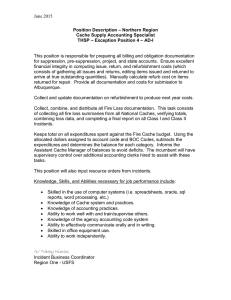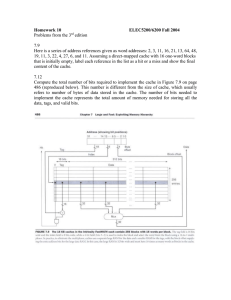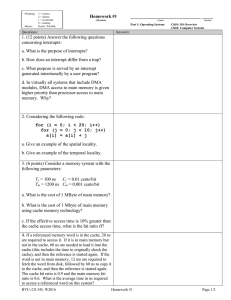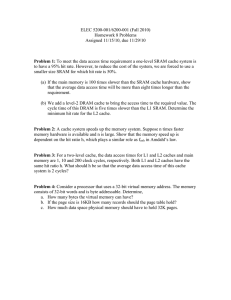MLX1 A Tiny Multithreaded 586 Core for Smart Mobile Devices
advertisement
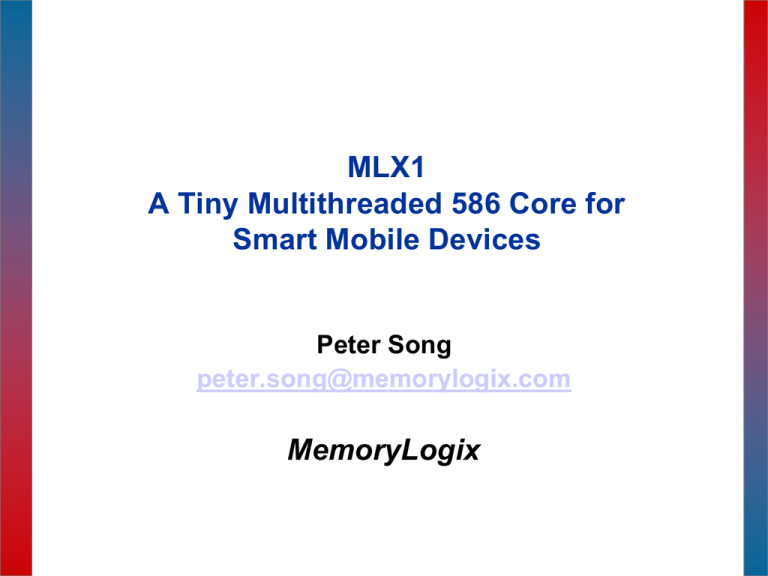
MLX1 A Tiny Multithreaded 586 Core for Smart Mobile Devices Peter Song peter.song@memorylogix.com MemoryLogix Mobile x86 core sizes are ~10X ARM10 core Mobile Processors (0.13µm) Total Cache (KB) Die Size (mm²) Est. Core Size (mm²) Core Size Ratio Typical Speed (MHz) Intel ULV PIII-M 544 80 ~34 ~13 >800 AMD Duron* 192 55 ~37 ~14 >800 TM5800 640 55 ~25 ~10 >800 VIA C3 192 52 ~31 ~12 >800 ARM 1026EJ-S 32 4.6 2.6 1 >400 ARM 1026EJ-S has DSP and Jazelle, and is synthesizable. * Duron’s sizes are normalized from 0.18µm. MPF 2002 2 MemoryLogix Why are current x86 cores so large? • X86 designed for peak frequency, performance – – – – Large multi-level caches, TLBs (>30-50% of die) Superscalar, speculative execution Branch prediction tables, trace caches Big transistors, replicated logic for speed • Many x86 features not in ARM architecture (yet) – – – – – MPF 2002 FPU, MMX, SSE (20-30% of core) System features (I/O, tasks, SMM, Machine-check, MP, …) Many (>100) model-specific registers (started w/ P6) Variable-length instruction decode (1-16 bytes) Segmentation 3 MemoryLogix MLX1 – Tiny Multithreaded 586 Core for Smart Mobile Devices • Smart mobile device requirements – Balanced communication + entertainment + computing performance – High MIPS / Watt – Low cost • MLX1 design goals – – – – – MPF 2002 A “synthesis-friendly” x86 core Support FPU, MMX Support variable size cache and TLB using 1-port SRAMs 2.5X the size of ARM10 core (<1/4 size of mobile x86 cores) 2.5X system performance of single-threaded core / MHz 4 MemoryLogix MLX1 Design Strategy • Simple and small – – – – Scalar RISC pipeline Optimized for frequently used instructions Features to map efficiently x86 & Java instructions RISC-style microcode to map complex instructions • High speed – No pipeline stall between queued stages – 3-cycle access to large L1 cache • High performance by high utilization – SMT (simultaneous multithreading) w/ little area overhead – Threads share a register file – Threads share a non-blocking, 8-bank unified cache MPF 2002 5 MemoryLogix Typical x86 Instruction Set Usage • On mostly integer applications – – – – 92% are RISC-like Only 2% are ALU w/ memory operand 80% of all branches use 8-bit offset 35% of loads are relative to stack pointer • Frequent register copy – MOV reg,reg – MOVQ mmx,mmx 13% varies • Float/MMX apps may use more loads and stores • Statistics from Win95 applications – Old but still good – Newer optimizations are more RISC-like, using CMOVs and fewer branches MPF 2002 6 EXE reg,imm 30% EXE reg,reg 20% MOV reg,reg 13% LOAD reg 10% JMP/JCC rel8 10% PUSH/POP 5% STORE reg 2% CALL/RET 2% TOTAL 92% MemoryLogix branch target prefetch : 2,3 MLX1’s Multi-fetch, Scalar-execute Pipeline translate cache hit rename IQs, issue cache read operand read translate cache hit cache read store queue load align cache write load-use : 3 inst. buffer fetch X86-to-RISC decode branch cond : 3 execute result cache RF write completion X86-Flavored RISC MPF 2002 7 MemoryLogix branch target prefetch : 2,3 MLX1’s Multi-fetch, Scalar-execute Pipeline translate cache hit rename IQs, issue cache read operand read translate cache hit cache read store queue load align cache write load-use : 3 inst. buffer fetch X86-to-RISC decode branch cond : 3 execute result cache RF write completion X86-Flavored RISC MPF 2002 8 MemoryLogix branch target prefetch : 2,3 MLX1’s Multi-fetch, Scalar-execute Pipeline translate cache hit rename IQs, issue cache read operand read translate cache hit cache read store queue load align cache write load-use : 3 inst. buffer fetch X86-to-RISC decode branch cond : 3 execute result cache RF write completion X86-Flavored RISC MPF 2002 9 MemoryLogix branch target prefetch : 2,3 MLX1’s Multi-fetch, Scalar-execute Pipeline translate cache hit rename IQs, issue cache read operand read translate cache hit cache read store queue load align cache write load-use : 3 inst. buffer fetch X86-to-RISC decode branch cond : 3 execute result cache RF write completion X86-Flavored RISC MPF 2002 10 MemoryLogix Multi-fetch Using 3 Identical Fetch Units • Each fetch unit – Operates independently – Holds five 8-byte blocks – Prefetches up to 3 blocks from sequential path – Prefetches 2 blocks from target path as condition is evaluated 8B 8B 8B 8B aligner 8B decode buffer • Cache-location aware logic – Determines cache location of the next sequential 64B line – Remembers cache locations of two previous 64B lines thread select mux instruction size MPF 2002 11 MemoryLogix Threads Share a Single-instruction Decoder • ROM-based decode – – – – – – Easy to design & modify Complexity independent 512 words x D wide 430MHz, 0.05 mm2 (0.13µm) or 700MHz, 0.1mm2 fast SRAM 1-cycle size decode is speed critical thread select mux X86 decode ROM • Thread switch can occur – – – – – MPF 2002 Thread’s decode buffer not full Thread’s issue queue full After a branch, 4-cycle load, … After a serialization instruction After 8th consecutive decode 12 synthesized logic speed-critical decode complex-expression decode MemoryLogix Threads Share Rename Registers • Pointer-based register renaming – – – – – 3 threads share a queue of 64 rename registers (8 GPRs + EIP) Rename registers hold future, architectural, temporary values Thread has own future register map, updated at rename Thread has own arch. register map, updated at completion On exception, future map restored from architectural map • A few-bit reference counter per rename register – – – – – MPF 2002 Enables register copy w/o copying values Example : MOV R1, R2 à copy R2 pointer to R1 map Increment count on reference Decrement count on dereference Supports fast & efficient inter-thread register copy 13 MemoryLogix Threads Share a Unified Cache • 3-cycle access – – – – – 1 : Tag access for hit check 2 : Data access when needed 3 : Data alignment & routing Use prefetch to reduce penalty Supports large L1 cache • Up to 8 accesses / cycle – 8 banks / line, 8 bytes / bank – Support multiple instruction fetch clock edge ... Tag 1 physical adrs Tag N hit detect other requests mux Bank 1 mux ... Bank 8 • N-way set-associative – – – – MPF 2002 N can be any integer True LRU replacement Set partitioning and locking Reduces multithread conflict 14 8B select mux load aligner MemoryLogix One-cycle Load From Stack • 35% of loads are relative to stack or base pointers – POP reg – MOV reg, [ESP/EBP,im8] ; “C” local variables & arguments • Cache-location aware logic for top 256 bytes on stack • Cuts load-use penalty from 3 to 0 cycle • Supports Java hardware acceleration w/o register stack ISSUE pop add READ load-use penalty 3 add EXE add 0 $ HIT $ RD ALIGN MPF 2002 15 pop pop MemoryLogix MLX1 Targets System-on-Chip Solutions >400 MHz synthesized, 0.13µm SMT 386 3.5 mm2 MMX 1.0 mm2 FPU 1.5 mm2 MLX1 6.0 mm2 Embedded PC: MLX1 + $ + PC peripherals MPF 2002 16 Ultra-low power premium devices: 1G DRAM : 95% MLX1 + $ : 5% (0.09 µm) Mobile devices: MLX1 + $ + mobile peripherals Mobile Xbox: N x MLX1 + $ + 3D graphics + game peripherals MemoryLogix MLX1 Leverages from X86 PC Platform • PC platform has the best industry support – – – – – Supported by 100’s of companies and $Billions every year Most number of low-cost peripherals Most amount of application code and device drivers Best software development tools Most number of programmers • PC platform will expand – To higher performance, more functionality – To lower cost & power consumption, smaller form factors • PC platform will enable successful Post-PC devices – Simpler, smaller, cheaper, lower-power PC in user-friendly shells MPF 2002 17 MemoryLogix Summary • An x86 core can be made as small as an ARM core – – – – More complexity does not necessarily require larger die area Design as small scalar core + FPU + MMX ARM also has integer + Thumb + DSP + Jazelle + VFP + SIMD A core will occupy increasingly smaller portion of an SoC • MLX1 – – – – A tiny “synthesis-friendly” 586 core for SoC solutions For smart mobile devices that demand high MIPS / W Uses SMT to deliver more performance in smaller die area Leverages from the PC platform • Contact us for more detail MPF 2002 18 MemoryLogix
